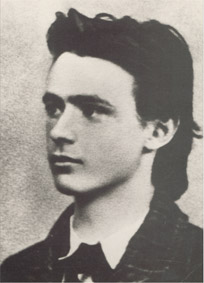Rudolf Steiner
Rudolf Steiner (25 February 1861 – 30 March 1925) was an Austrian philosopher, social reformer, architect, and esotericist. Steiner gained initial recognition at the end of the nineteenth century as a literary critic and published philosophical works including The Philosophy of Freedom. At the beginning of the twentieth century, he founded a spiritual movement, Anthroposophy, with roots in German idealist philosophy and theosophy; other influences include Goethean science and Rosicrucianism.
Biography[edit | edit source]
Rudolf Steiner was born in Donji Kraljevec, then part of the Austrian Empire (present-day Croatia). He later moved to Weimar to work as an editor at the Goethe and Schiller archives. Steiner's early work was influenced by the writings of Goethe and he published several works on Goethe's scientific writings. In 1899, Steiner published The Philosophy of Freedom, which emphasizes the importance of spiritual activity and human creativity. This work laid the foundation for his later spiritual research.
Anthroposophy[edit | edit source]
In the early 20th century, Steiner developed Anthroposophy, a spiritual philosophy that sought to use mainly natural means to optimize physical and mental health and well-being. Anthroposophy proposed a path for spiritual development that could complement and enhance scientific understanding. Central to Anthroposophy is the belief in the possibility of gaining spiritual knowledge through a form of disciplined inner development that Steiner described in detail.
Steiner's work in Anthroposophy extended into various practical areas including education, agriculture, and medicine. In education, he founded the Waldorf School movement, which emphasizes imagination in learning and aims to integrate holistically the intellectual, practical, and artistic development of pupils. In agriculture, he initiated Biodynamic farming, which is one of the earliest forms of organic farming. Steiner's approach to medicine was to create a form of integrative care that combined spiritual insight with empirical methods of healing, leading to the development of Anthroposophical medicine.
Architecture and the Arts[edit | edit source]
Steiner also made significant contributions to architecture, designing the Goetheanum, a cultural center in Switzerland that serves as the world headquarters for the Anthroposophical Society. The building is notable for its unique architectural style, which reflects Steiner's spiritual and artistic principles. In the arts, Steiner's ideas inspired new approaches to drama, painting, and sculpture. He advocated for a renewal of the arts through a spiritual understanding of artistic processes.
Legacy[edit | edit source]
Rudolf Steiner's work has had a lasting impact on various fields, including education, agriculture, medicine, and the arts. His ideas continue to inspire new generations of educators, farmers, doctors, and artists around the world. Despite controversy over some of his concepts and methodologies, Steiner's holistic approach to human development and well-being remains influential.
Steiner's comprehensive approach to knowledge and his emphasis on the spiritual dimension of human life have contributed to a broad spectrum of activities known as Steiner or Waldorf education, biodynamic agriculture, and anthroposophical medicine, among others. His work continues to be studied and applied in various contexts globally.
Search WikiMD
Ad.Tired of being Overweight? Try W8MD's physician weight loss program.
Semaglutide (Ozempic / Wegovy and Tirzepatide (Mounjaro / Zepbound) available.
Advertise on WikiMD
|
WikiMD's Wellness Encyclopedia |
| Let Food Be Thy Medicine Medicine Thy Food - Hippocrates |
Translate this page: - East Asian
中文,
日本,
한국어,
South Asian
हिन्दी,
தமிழ்,
తెలుగు,
Urdu,
ಕನ್ನಡ,
Southeast Asian
Indonesian,
Vietnamese,
Thai,
မြန်မာဘာသာ,
বাংলা
European
español,
Deutsch,
français,
Greek,
português do Brasil,
polski,
română,
русский,
Nederlands,
norsk,
svenska,
suomi,
Italian
Middle Eastern & African
عربى,
Turkish,
Persian,
Hebrew,
Afrikaans,
isiZulu,
Kiswahili,
Other
Bulgarian,
Hungarian,
Czech,
Swedish,
മലയാളം,
मराठी,
ਪੰਜਾਬੀ,
ગુજરાતી,
Portuguese,
Ukrainian
Medical Disclaimer: WikiMD is not a substitute for professional medical advice. The information on WikiMD is provided as an information resource only, may be incorrect, outdated or misleading, and is not to be used or relied on for any diagnostic or treatment purposes. Please consult your health care provider before making any healthcare decisions or for guidance about a specific medical condition. WikiMD expressly disclaims responsibility, and shall have no liability, for any damages, loss, injury, or liability whatsoever suffered as a result of your reliance on the information contained in this site. By visiting this site you agree to the foregoing terms and conditions, which may from time to time be changed or supplemented by WikiMD. If you do not agree to the foregoing terms and conditions, you should not enter or use this site. See full disclaimer.
Credits:Most images are courtesy of Wikimedia commons, and templates, categories Wikipedia, licensed under CC BY SA or similar.
Contributors: Prab R. Tumpati, MD






